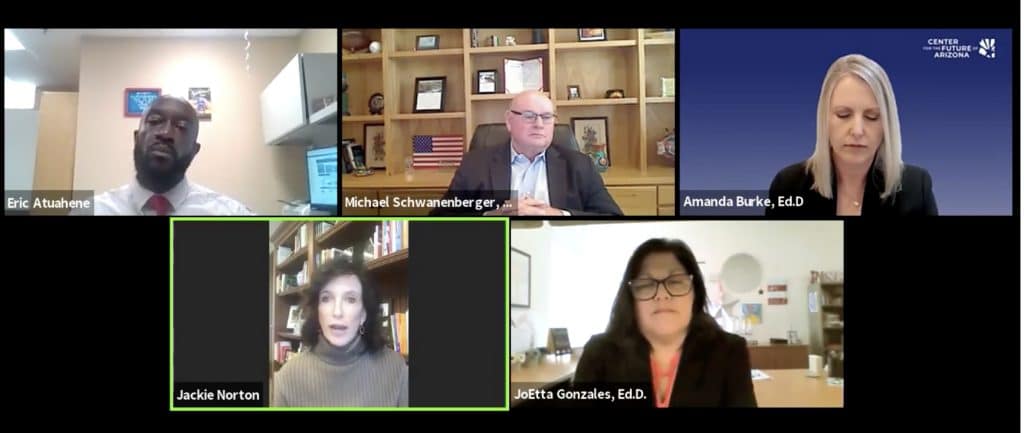Northern Arizona University education associate professor Michael Schwanenberger was an invited expert in a statewide summit aimed at supporting K-12 leaders, both during the COVID-19 pandemic and in the long-term.
The Great Leaders, Great Schools: Arizona Summit on Education Leadership was sponsored by Gov. Doug Ducey’s office, the Arizona Board of Regents, the Center for the Future of Arizona and The Hunt Institute. Experts focused on the importance of investing in flexible and diverse leadership in the state’s K-12 schools. Schwanenberger, who is chair of the Department of Educational Leadership in the College of Education, was on a panel about the Beat the Odds School Leadership Academy, a program designed to prepare principals for school leadership.
All of the experts repeatedly highlighted the need for strong leadership in K-12 schools, which has a direct effect on the empowerment and diversity of teachers in the same schools. They discussed how early success in a child’s education helped build a foundation that will lead to greater success in college and careers.
Regent Fred DuVal, who chaired the event, emphasized the importance of education for Arizona’s economy and beyond, and that good education came not just from teachers but also from the principal.
“We on the Board of Regents believe that education is the most important driver of 21st-century knowledge-based economy, that talent is equally distributed but opportunity is not, and that closing that gap is the civil rights issue of our time,” DuVal said. “It is the moral imperative of our times. Funding matters, accountability matters, support systems matter … and leadership really matters.”
Schwanenberger, who was in school leadership, serving as a principal and superintendent, for 27years prior to joining the faculty at NAU, also was part of the first Beat the Odds (BTO) cohort in Flagstaff, which finished its program on Thursday. The participants included public and charter school principals and teachers who were interested in administration as well as educational leadership faculty from NAU.
He worked with FUSD Superintendent Mike Penca and LAUNCH Flagstaff’s Paul Kulpinski to bring the BTO Academy to Flagstaff; it was the first cohort outside of the Phoenix area. The cohort met for two days a month every month since last summer (with accommodations for COVID-19) to discuss best practices, brainstorm solutions to problems, share ideas and network. Schwanenberger said all the participants have reported the benefits they’ve seen in leadership at their schools.
“We really want principals to understand the diversity of our community, that no two schools are alike even though they may be across the street from each other, and the need to be agile and flexible,” he said. “Most principals don’t understand the important role that they play in economic development and the importance of the schools as centers within their communities. Schools nowadays are much more than just academic institutions, and we need to take care of the needs of all our students, no matter what the circumstances under which they come to us.”
NAU also has taken a leading role in promoting BTO as well, which ABOR Chairman Larry Penley noted in his remarks at the summit, commended NAU President Rita Cheng and College of Education Dean Ramona Mellott for their support of the Flagstaff cohort. Cheng announced last year that any administrator who participated in the program would receive six credits in a master’s or doctoral educational leadership program, which Schwanenberger said helped as well.
“We need to focus overall in the state of Arizona on attainment,” he said. “As chairman of the Arizona Board of Regents and as a member of the board along with Fred DuVal, all of us on the board have paid close attention to the level of attainment in Arizona. We’re a long way from where we need to be.”
Watch the summit on The Hunt Institute’s Facebook page.
Heidi Toth | NAU Communications
(928) 523-8737 | heidi.toth@nau.edu




